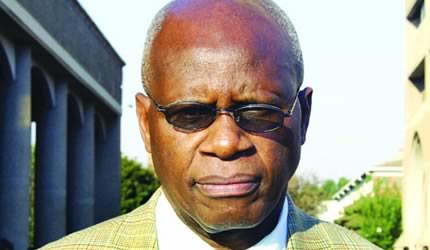Zimbabwe, UK in talks to thaw frosty ties Minister Patrick ChinamasaFarirai Machivenyika Senior Reporter
Minister Patrick ChinamasaFarirai Machivenyika Senior Reporter
Thursday, 28 March 2013 - herald.co.zwBRITAIN has finally agreed to engage with Zimbabwe at bilateral level to resolve the land issue that has been at the centre of the strained relations between the two countries for over a decade.
This followed a meeting between representatives of the inclusive Government and Western countries calling themselves “Friends of Zimbabwe” held in London on Tuesday.
Justice and Legal Affairs Minister Patrick Chinamasa said the illegal sanctions that have been imposed on Zimbabwe had caused untold suffering to ordinary people and reiterated that any country that was party to the embargoes would not be allowed to observe the forthcoming harmonised elections.
The Zimbabwean delegation attended the meeting at the invitation of British Parliamentary Under Secretary of State for Foreign and Commonwealth Affairs Mr Mark Simmonds.
Minister Chinamasa, who is also Zanu-PF Deputy Secretary for Legal Affairs, yesterday confirmed the British had expressed willingness to re-engage Zimbabwe.
“The Zanu - PF party welcomes the statements made by Ministers Simmonds and (Lynne) Featherstone (Minister for International Development) on the need to turn a new leaf on the relations with Zimbabwe and to engage bilaterally on resolving the land issue and other matters between Harare and London.
“It has always been the position of Zanu-PF that the British and Zimbabweans in London should engage at a bilateral level to resolve their quarrels. The problem between Britain and Zimbabwe emanates from the British’s opposition to the land reform programme and not a violation of human rights as alleged.
“This human rights issue was just red herring to get sympathy from other Western countries and institutions,” he said in a communiqué after the meeting.
Minister Chinamasa said they had indicated to the British that the ball was in their court and that Zimbabwe was ready to engage them anytime.
Britain canvassed for support from its Western allies and the EU in direct response to the decision by Zimbabwe to embark on the fast-track land reform to correct colonial imbalances.
This was after the British Labour government led by Mr Tony Blair then, reneged on its obligation agreed at the Lancaster House talks to fund land reform in Zimbabwe.
Minister Chinamasa said it was also ironic that the so-called Friends of Zimbabwe had imposed sanctions on the country.
“The Zanu-PF position is that friends do not impose sanctions against each other. It was pointed out that sanctions have brought havoc and untold suffering on the generality of Zimbabwe, the same people that the Friends of Zimbabwe purport to be assisting,” he said.
The minister said the illegal sanctions had collapsed Zimbabwe’s infrastructure and had been used to cause disaffection against Zanu-PF.
“Apart from undermining Zimbabwe’s economy sanctions have been used, through the travel bans, to deny the Government of Zimbabwe and Zanu-PF a platform to put across to the populations of the countries that imposed sanctions the true position that the quarrel between Britain and Zimbabwe was about the resolution of the land question and the alleged human rights violations,” he said.
The minister said meaningful re-engagement would take place if the sanctions were removed entirely and said there was nothing to celebrate on the latest moves by the EU to remove some officials from the sanctions list.
“Why should we welcome something that leaves the Head of State and Government (President Mugabe) on the sanctions list,” he queried.
The EU scrapped 81 individuals from the list but left President Mugabe, the First Lady and service chiefs and ZMDC and the Zimbabwe Defence Industries on the list.
“They also wanted to know whether they would be allowed to come and observe our elections and I categorically told them that countries that imposed sanctions would not be allowed as they will not be objective.”
Minister Chinamasa also explained to the meeting the thrust behind the country’s indigenisation policy.
“The international best practice including in the UK and Germany shows that the ownership of the economy should be reflective, numerically and materially, of the demographic composition of the population,” he said.
Minister Chinamasa said it was illogical for the country’s defence forces to defend an economy in which Zimbabweans had no stake.
Energy and Power Development Minister Elton Mangoma (MDC-T) and Regional Integration and International Cooperation Minister Pricilla Misihairabwi- Mushonga also attended the meeting.
Minister Misihairabwi -Mushonga confirmed that the delegation spoke against sanctions.
“We raised that issue and the UK said they operate under the EU and said they did what they could have done under the circumstances. We, however, told them that it was not enough as we expect the sanctions to be removed entirely.”
“Some of them also said that it would be good if they were to be invited to come and observe our elections but also supported the role that Sadc has been playing and said from now onwards they would take a cue from what Sadc is doing,” she said.
MDC-T’s representative Mr Mangoma could not be reached for comment.
The meeting also touched on issues to do with funding of elections, the role of Sadc and the international community and civil society and political violence.
Minister Chinamasa said Zimbabwe had the technical and legal framework to run free and fair elections but would not accept funding that came with conditionalities.
Source: herald.co.zw
